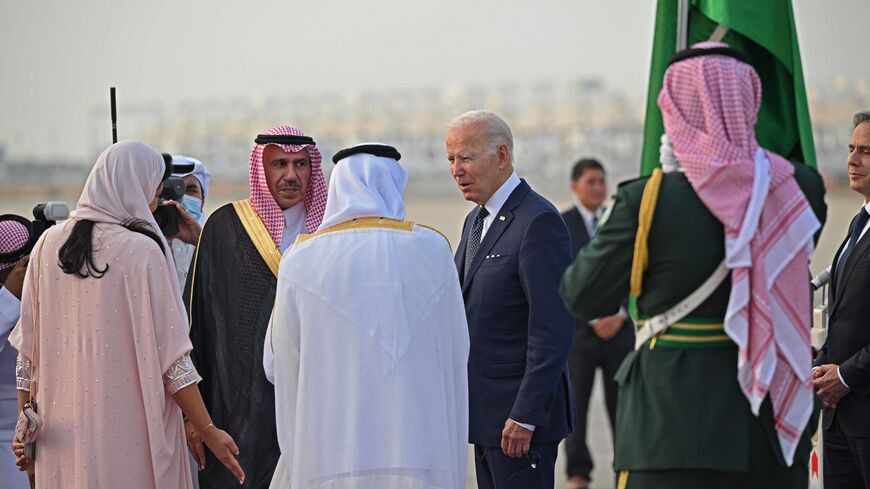TEL AVIV — After a May 7 meeting in Riyadh between US, Saudi, Indian and Emirati national security advisers, and an ensuing meeting in Jerusalem between US and Israeli senior officials, Israel is cautiously optimistic about rapprochement with Saudi Arabia.
The meeting in Riyadh focused on advancing a regional rail/ship interconnection framework, which Israel is also interested in becoming part of. And while Israel was not invited to Riyadh, the Biden administration is keeping it in the loop.
In another sign of advancing on that track, Axios reported on Tuesday that Ronen Levy, director general of the Israeli Foreign Ministry, arrived in Washington for talks with Deputy Secretary of State Wendy Sherman and White House senior adviser of energy Amos Hochstein, for strengthening and expanding the Abraham Accords.
Truth be told, with Israel under the rule of the most nationalist government in its history, the continued rapid US withdrawal from the Middle East and almost all the region’s Sunni states on a reconciliation course with Iran, the dream of peace between Israel and Saudi Arabia should have been relegated to the realm of science fiction. Surprisingly, it remains real.
Still, quite a few indications have emerged in recent weeks of developments on the Israeli-Saudi axis, among them a May 8 phone call between US Secretary of State Antony Blinken and Israeli Minister of Foreign Affairs Eli Cohen; a May 10 call between US national security adviser Jake Sullivan and his Israeli counterpart Tzachi Hanegbi, during which Prime Minister Benjamin Netanyahu also spoke briefly; and various remarks by senior officials involved in efforts to normalize Saudi-Israeli relations.
Sullivan himself met in Riyadh May 7 with Saudi leaders, after which two of President Joe Biden’s top advisers — US National Security Council coordinator for the Middle East and North Africa Brett McGurk and US special envoy on energy Amos Hochstein — flew to Israel from Saudi Arabia to update Netanyahu.
Prior to his departure for Riyadh, on May 4, Sullivan spoke with the Washington Institute for Near East Policy. “Ultimately getting to full normalization is a declared national security interest of the United States, we have been clear about that,” he said.
These optimistic signs regarding normalization prospects stem from shared interests. "Once all sides of this triangle have an interest in reaching the same goal, discussion is possible," a senior Israeli diplomatic source told Al-Monitor on condition of anonymity. “For Netanyahu, the Saudi issue is now more important than anything else in his foreign policy, and perhaps in his domestic policy as well. He knows that Israel cannot stop Iran on its own.”
The source pointed to the plunge in domestic support for Netanyahu over the controversial judicial overhaul his government is leading and an economic downturn. “All that remains for him to present to the public is Saudi Arabia. This would restore his public image as a world-class leader. He dreams about it day and night," the source said.
Netanyahu aides believe an agreement with Saudi Arabia would change the face of the Middle East, removing the final obstacles to Israel’s full integration into the region, equating its magnitude with that of Israel’s historic 1979 peace treaty with Egypt, its first with an Arab state. Israel believes this would pave the way for agreements with Muslim states such as Indonesia, and given Saudi Arabia’s importance in the Arab world and its huge economy, relations with the kingdom are an overriding strategic interest.
None of these familiar arguments explain why the Israeli dream has not been buried despite the extremist policies of Netanyahu’s sixth government.
"The key to an Israeli-Saudi agreement lies in Washington, and contrary to what people presume, it is on President Biden's desk and not buried deep in a side drawer,” said the Israeli diplomatic source.
“The Americans fully understand that such an achievement would greatly improve the president's standing before the elections. This will be proof of his vitality, his assertiveness, his ability to change history, and it will also be perceived as a countermeasure to China's rapid expansion in the region. It's a coveted prize in Washington. It may not be necessary, but it's a very worthwhile bonus and the administration is willing to invest in it," the source added.
What, then, is preventing the historic agreement between Israel and Saudi Arabia from taking shape?
"The Saudis are demanding real input from the United States," explained a senior Israeli political source, speaking on condition of anonymity. "They are willing to take the plunge, but only if it is very worthwhile for them. They demand contracts for the supply of sophisticated weapons; in fact they demand a status equal to that of Israel in terms of US arms supplies. They also want a Saudi-American defense agreement that will require the US to rush to Saudi Arabia's aid if attacked, and finally, they want US assistance to establish a civilian nuclear project."
According to this assessment, the third Saudi demand is the most problematic. "With Iran already a threshold state, if Saudi Arabia becomes a civilian nuclear state, a crazy Middle Eastern nuclear race is inevitable," said the political source.
Is Netanyahu ready for the United States to empower Saudi Arabia to such an extent, including aiding a civilian nuclear program? Probably.
"It is very important for him to present this achievement; its price at the moment is less relevant," admitted the Israeli diplomatic source. "He [Netanyahu] needs this achievement, Biden needs this achievement, the only question is what can be finalized with Mohammed bin Salman in order to reach it."
Could a historic Israeli-Saudi agreement be reached as Saudi Arabia, the Gulf states, and even Egypt and Jordan are engaged in a rapid rapprochement with Iran?
According to the diplomatic source, the answer is yes. "This is the name of the game today in the Middle East in general and in the Gulf in particular. Everyone plays a double game. … This is evident when it comes to the Emirates, Qatar, which has made this a real art, and many other countries. The weakening of the American-Israeli axis is moving all the countries toward Iran, but they have no problem keeping the axis open to the other side as well," the source said.
The pragmatic policy of keeping all options open is reflected in public Saudi attitudes, according to the findings of a rare public opinion poll in Saudi Arabia, commissioned by the Washington Institute.
The poll, conducted in March/April 2023 and made public on May 15, found, for example, that 38% of Saudis do not oppose economic ties with Israel, "if it helps our economy." The 2020 Abraham Accords between Israel and the Gulf states and Morocco also enjoy 38% support, while 76% of Saudis believe that rocket fire by Hamas into Israeli territory has a "negative impact" on the region. However, 81% of Saudis believe that in the event of an earthquake or other natural disaster, such as those that occurred this year in Turkey and Syria, "Arab countries should refuse any humanitarian aid from Israel."







